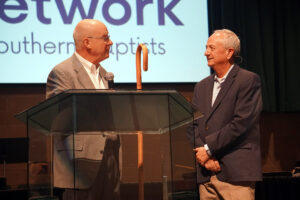
Less than 7 percent of what we do is working.
Let’s name it plainly: Most of what we call “parent ministry” in the church today isn’t working.
According to Lifeway Research in “Define the Relationship,” less than 7 percent of church-going families said that what their church is currently doing to encourage spiritual activity at home is having long-term effectiveness.
Seven. That number represents a systemic mistake.
If you’re a youth pastor, you probably already feel this, but you may not have known why.
The fallacy of efficiency
Ministers have worked hard to make youth ministry more efficient. The demands of reaching as many students as possible every week on a shrinking budget pushes us towards it. We are all trying to get as much as we can out of what we have, and the season leading into the fall semester is full of our best efforts. Social media updates. Polished PDFs. Weekly Email updates. Automated check-ins. Streamlined schedules. It’s all neat, organized and can be perfectly ineffective.
As a result, parent ministry has suffered the same. Ask any youth pastor if ministering to and partnering with parents is important, and they will tell you yes. Just don’t ask them how it’s going.
Why? Because it’s often devoid of the same messy youthfulness that makes youth ministry great.
In fact, we’ve communicated to parents with clinical precision while slowly stripping ministry of its relational potency. We’ve asked them to partner with us through online registration links and an email newsletter expecting meaningful discipleship to emerge from a PDF. We messaged them about timely payments for camp, because we want their kid there, but haven’t messaged enough about why they might not make it this year.
It’s not that these tools are wrong. But they can become the business of ministry without the relationship.
When we worry about the scale of ministry beyond its necessary size, we may think we are “poised for growth.” And we are trying to “reach more” with less real contact; we lose the power of what makes ministry transformative in the first place: being known.
But more churches and youth ministries are suited to minister relationally than scale efficiently, because the church’s work happens in the messy middle of relationships.
The humanity we’ve forgotten
Somewhere along the way, we made a critical error: we assumed the adulthood of our students’ parents and removed their humanity. We imagined they’d respond to logical strategy more than loving presence.
Even though they rate our strategies as ineffective, they still like us.
89 percent of church-going parents agree that their family has a good relationship with the leader of their church’s student ministry. It’s not you, it’s what we have tried.
That’s good news!
Parents are still open to a coffee, a text, a real moment of connection. The average parent might not attend your quarterly info meeting, but they will respond to an invitation to talk about their kid. They will show up when they feel seen.
We’re asking them to do courageous, deeply relational work; discipling their teenagers in today’s culture; but we are asking through the wrong means. Through cold communication and detached programming. It doesn’t match. No wonder it doesn’t stick.
What’s not working in parent ministry (and why)
Here’s a quick gut check. Nod along if you feel me. …
- You sent the email. No one replied.
- You hosted the meeting. Some registered but on the day of … ghost town.
- You launched the resource kit. It’s still in the church lobby.
The issue isn’t apathy. It’s scale.
When we scale parent ministry like a product launch, we miss the point. Parents don’t need another resource. They are flooded with ideas. What they need is a relationship about their kid.
They need a trusted church leader to ask, “How’s your kid doing really?” and mean it. People show up when they feel known.
Here’s the turn: We’re still hopeful!
Yes, there’s reason for concern – but it’s not a chasm of despair. What we need isn’t panic – it’s a reordering of our approach. Failure isn’t final. It’s a teacher. It reminds us that, at our most basic level, we’re all just in need of relationship.
1. Connection is the starting point, not the destination.
We have more ways than ever to reach families – texts, calls, coffee meetups. These are real platforms for ministry. And if we start there, personal, relational connection, rather than another mass email or general newsletter, our efforts become far more effective. Ministry moves at the speed of relationship, not automation.
2. Discipleship is modeled – not mass produced.
Our goal hasn’t changed: we want to see parents show their students what it looks like to walk faithfully with Christ. But you can’t model what you’ve never seen. When we lead with connection, we start to really know families. That’s when our ministry stops being one-size-fits-all. Over coffee, we learn that a mom wants to help her son read Scripture regularly. That’s when we can hand her a Bible-reading plan or walk with her through those tough spiritual questions. That doesn’t happen in another email – it happens across the table.
3. You’ve got relational equity – spend It.
You’ve already built trust with their teenagers. That trust is real. It’s earned. And it opens the door to something deeper. So don’t spend it on another reminder email. Spend it where it matters, one conversation at a time. Face to face. Heart to heart.
From failure to faithfulness
Paul wrote in Ephesians 4:15-16 (CSB), “But speaking the truth in love, let us grow in every way into him who is the head – Christ. From him the whole body, fitted and knit together by every supporting ligament, promotes the growth of the body for building up itself in love by the proper working of each individual part.”
Each part. That includes parents. That includes you, church leader. We are all the parts interconnected.
This isn’t about giving up on structure; it’s about redefining success. It’s about remembering that you’re not just a program director. You’re a relationship builder. A spiritual coach. A bridge-maker.
So if your connect card system is sharp, your graphics are crisp and your parent packets are well-formatted but no one’s calling you back – pause and ask: Am I ministering to people or maintaining processes?
Let’s put the “ministry” back in parent ministry.
There are even more hopeful stats, stories and helps in the book “Define the Relationship.” We (Zac & Chad) worked alongside our Lifeway Research team to bring insight from over 1,000 youth leaders and 1,000 church-going parents. You can read more and learn more about the turn towards HOPE in the book.
It’s not about being perfect. It’s about being present. It’s not about launching a new program. It’s about having an old-school phone call.
So go ahead. Pick up the phone. Text a parent today. Invite someone to coffee this week. Not because it’s strategic, but because it’s good.
And in a world where only 7percent say what we’re doing works, maybe that’s exactly the courage we need to rediscover what matters most.
Chad Higgins resides in Stillwater, Oklahoma with his wife of sixteen years, Martha, and their daughter, Malia. With over two decades of ministry experience, Chad has served the church in Oklahoma as a youth pastor, small group pastor, and campus pastor. He is the co-founder of Youth Ministry Booster and now leads as the Senior Manager of Church Equipping at Lifeway. Chad is passionate about empowering healthy ministers to thrive in their calling and to strengthening the church for generations to come. When he’s not equipping leaders, he enjoys savoring a good cup of coffee, hitting the golf course, or strategizing his next chess move.
Zac Workun serves as the Student Ministry Specialist for Lifeway Students and is the co-founder of Youth Ministry Booster, where he connects, equips, and encourages youth pastors around the country. He’s a book-devouring, game-loving, car-camping, folk-music-strumming, black-coffee-drinking beard enthusiast who brings big energy and big laughs wherever he goes. Zac thrives on new adventures, especially if they involve breakfast food with his wife, Karen, and their two wild and wonderful boys, Isaiah and Gideon.














